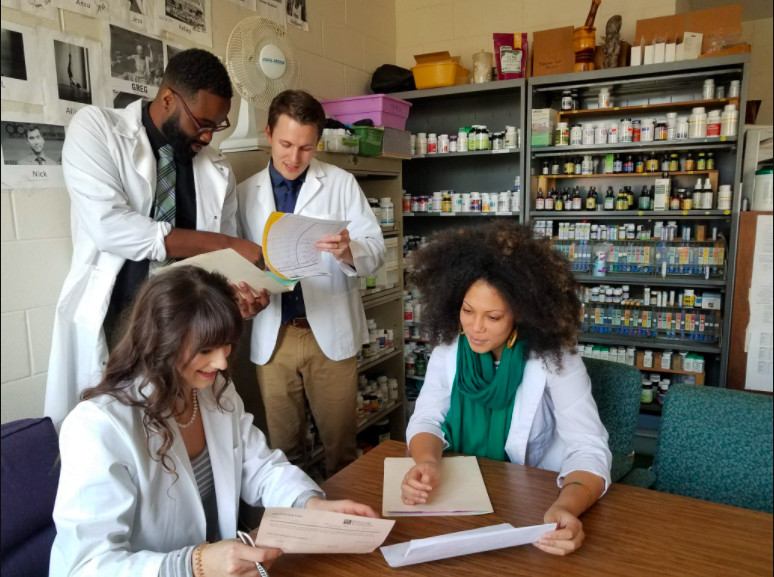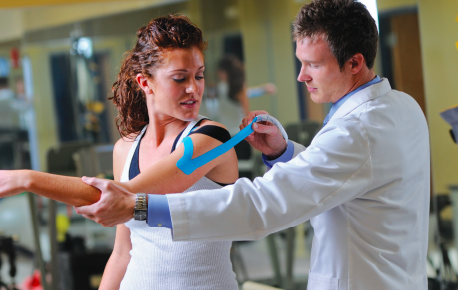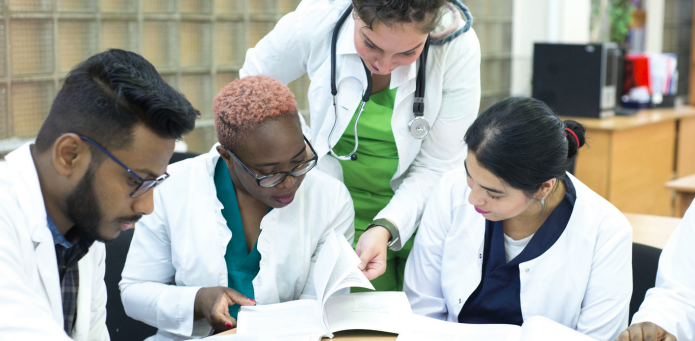 Today, National University’s graduates face a promising health care landscape. Over the decades, alternative medicine has continued to expand its reach everywhere from hospital settings to medical tents at the Olympic Games.
Today, National University’s graduates face a promising health care landscape. Over the decades, alternative medicine has continued to expand its reach everywhere from hospital settings to medical tents at the Olympic Games.
With the persisting opioid epidemic, obesity epidemic, and the antibiotic resistance crisis increasing demand for natural, nonpharmacological solutions as well, highly trained and skilled graduates are needed more than ever.
As the industry continues to evolve and grow, NUHS is updating its curriculum so students can meet today’s challenges. Along with the new business courses implemented in spring, NUHS will add new courses within both the chiropractic medicine program and naturopathic medicine program in January. The courses will give students a more in-depth understanding of specific specialties, therapeutics, and the thought processes they can expect to encounter in practice.
Chiropractic program’s new curriculum offers more hands-on practice and new course options
Starting in the New Year, NUHS Doctor of Chiropractic program will usher in an extensive curriculum update. The changes are designed to offer more hands-on technique practice, better align with the clinical thought process and provide more course options for popular specialties like sports medicine, functional medicine and women’s health.
“We continuously look at our curriculum to ensure students are best prepared for their future careers in practice,” said Jeffrey Ware, MS, DC, DABCI, the assistant dean of the NUHS chiropractic program.
The changes are based on faculty input, surveys completed by students and alumni, along with current and future practice models. Additionally, Ware said National University remains committed to providing an evidence-informed, full-scope curriculum.
Following the clinical thought process
Within the curriculum, several courses were re-arranged to follow what happens in the sequence of the clinical thought process for patient care, specifically starting with a patient’s history and working up to performing exams, diagnosing and putting together a treatment plan. Students will experience examination and diagnosis courses first, followed by classes focused on specific conditions.
“By re-sequencing courses, students are able to better understand how each step of the clinical thought process leads to another,” Dr. Ware said.
 New specialty courses
New specialty courses
NUHS continues to focus on treating the whole body and providing students with treatment tools beyond just adjusting. Boasting one of the most comprehensive sequences of nutrition curriculum available, NUHS ensures students understand how a proper diet and other natural therapies can play a key role in promoting healing and preventing disease in their patients.
Unique to NUHS, the chiropractic medicine curriculum now includes a class in homeopathy. At the NUHS Whole Health Center, students are able to put this tool into practice by utilizing the extensive herbal and supplement dispensary.
Other new additions to the curriculum include elective courses in sports medicine, functional medicine and women’s health. Not only are these specialties seeing growth within the industry, these topics were the most popular among surveyed students.
New in-depth business curriculum
A new set of business courses was implemented last spring to better prepare students for all the nuances of running a business.
The courses have been specifically sequenced to build on each other. This program structure provides an in-depth understanding of the many small details that go into starting and managing a successful practice. Students learn how to get a loan, advertise their services, choose a location, lease a building, manage employees and use accounting software.
The business curriculum includes five courses: Professionalism, Ethics & Law; Patient Communication and Marketing; Starting a Practice; Managing a Practice; Billing, Coding, Documentation and Compliance.
“In our new and improved curriculum, we cover every aspect required to be a well-rounded, successful doctor,” Dr. Ware said. “When students graduate they will be ready to operate a full-scope practice in all 50 states as well as understand how to run a profitable business.”
 Naturopathic medicine program adds new integrative classes to its curriculum
Naturopathic medicine program adds new integrative classes to its curriculum
The NUHS naturopathic medicine program will add new courses to help prepare students for an evolving health care marketplace that’s becoming increasingly more integrative.
These courses include Integrative Therapeutics I, II, III, which will focus on creating and contributing to treatment plans that utilize various types of therapies used within naturopathic medicine, conventional medicine and other disciplines.
“It’s important to see how different therapies can be part of a well thought-out treatment plan,” said Fraser Smith, ND, Assistant Dean of the NUHS naturopathic medicine program. “They’re not just a salad of guesses. They are all there for a reason, to help support some organ or tissue, or alleviate some distress or pain.”
During each course of Integrative Therapeutics I, II, III, students will examine four patient cases and build an evidence-based treatment plan. Students will start by determining what aspects of patient function (like circulation, nutritional status, etc.) and what structure issues they want to correct. Then they’ll review options and consider the evidence.
One week will focus on the basic determinants of health (lifestyle, environment, sleep, hydration, etc.) The next week will focus on botanicals and nutrients supplements followed by physical medicine. As students progress, they learn more about what therapies pertain to which level of the order. They’ll also work through more complex cases.
“The order is not a rigid sequence, but it does follow a sequence of steps that can support the natural tendency to heal,” Dr. Smith said. “It also allows the practitioner to jump in further along or up in the order when the situation calls for it.”
Integrative Oncology
In 2024, the naturopathic program will strengthen the integrative oncology curriculum by adding a new advanced course. In Integrative Oncology, students will learn how to treat various types of cancer. Currently, the subject matter is taught within another course, but the new class will allow students to understand the topic more in depth.
“The field is developing so quickly, it’s important to have protected time in the program to delve into these topics even more,” Dr. Smith said.
While developing the new courses, NUHS gathered student feedback from small group meetings, town hall style open forums, one-on-ones, and surveys. Leadership also looked at where students seemed to need more support.
“As the field evolves, as science advances, we are doing all that we can to ensure our students are best prepared,” Dr. Smith said.




0 Comments